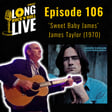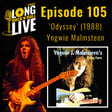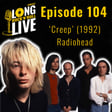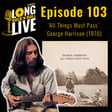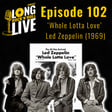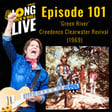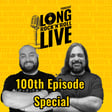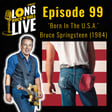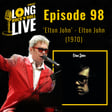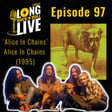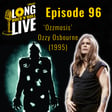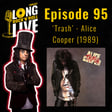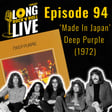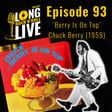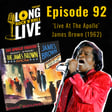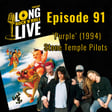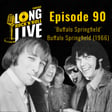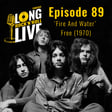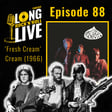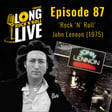Become a Creator today!Start creating today - Share your story with the world!
Start for free
00:00:00
00:00:01

107. "You Really Got Me" - The Kinks (1964)
The Kinks’ breakthrough single “You Really Got Me” marked a turning point in rock history. Driven by Dave Davies’ gritty, distorted guitar riff and Ray Davies’ energetic vocals, the song introduced a raw, riff based sound that would later shape genres like hard rock, heavy metal and punk. With its use of power chords and no-nonsense delivery, “You Really Got Me” stood apart from the polished pop of the early 1960s. The track’s unfiltered energy & volume helped define the British Invasion, influencing countless bands from The Who to Van Halen.
#TheKinks #YouReallyGotMe #ClassicRock #BritishInvasion #DaveDavies #RayDavies #RockGuitar #PowerChords #VanHalen #RockHistory
Transcript
00:00:00
Speaker
Before punk, before metal, before distortion pedals, one song changed everything. The Kinks didn't just write a hit in 1964, they wrote a song that shaped generations of rock music to come.
00:00:12
Speaker
Welcome back to the Long Live Rock and Roll podcast. You're here with your host Laz Michaelides and my co-host on the screen opposite the east, Felipe Ameren. How you doing bro? Doing great man and here. Good, yeah very well, thank you very well. A bout of lovely weather in England this this week, don't we?
00:00:27
Speaker
I love that. Isn't that just such a default British thing to do? We just go straight to the weather. Yeah, we got it. And then we're going to talk about train times. Exactly. exactly And how expensive things are going Tesco. So, yeah. Excellent. Right. Yeah, we've that. That's the whole conversation. That's it. Yeah. No, no, no. For anything else.
00:00:45
Speaker
We can all go. So. but Today we're talking about You Really Got Me by The Kinks. One of the most famous rock songs um in rock history. I mean, what would you first of all, before we get into the little aspects of it, what are your thoughts about the song?
00:00:59
Speaker
I love the song. it' it's It's so straight to the point. it's It's a fun song. that's like others so It's not pretentious. It's just a song. It's just something you listen to and it makes you...
00:01:12
Speaker
It makes you want to sing along and and and and dance. and And it's yeah, it always puts a smile on my face. That's what it is. One of the great riff and the kicks one my favorite bands as well. I um ah truly ah believe that they're one of those underappreciated bands that really deserved a lot more credit than they got. I mean,
00:01:31
Speaker
I think you've got those top three, haven't you? You've got the Beatles, the Who and the Rolling Stones, who people shape say shaped popular music in the 60s. And I really, really, i have a strong case that the Kings deserve to be there as well. I think i think as the other three, they they made it into the American market easily. And I think the Kings were, some people say they're too British for the American market. Some people say that they were just not commercial enough with their attitude and stuff.
00:01:56
Speaker
Well, I also heard that there was a dispute maybe with the the brothers and the management or something happened where they were planning an American tour And then the brothers had an argument and the tour collapsed and they never made it to America.
00:02:12
Speaker
So as you said, so maybe they needed that the the breakthrough in America. Maybe a problem. i think Maybe that's the only reason why they're not as famous as the other top three that mentioned. I think that's a fair thing. Yeah. Anyway, I'll talk give you the yeah the details of the song really quickly. So the song was released on the 4th of August, 1964, recorded the month before at the IBC studio in London.
00:02:36
Speaker
Genre. I mean, nothing oh yeah I think a nice simple one is it's rock music, especially for the time it was released. It's rock music. but However, there's been some others attributed to it. Some people have said garage rock, proto punk, hard rock, proto metal, which we'll get into.
00:02:52
Speaker
ah The song is two minutes and 20 minutes, two minutes and 20 seconds long, released on the Pi label in the UK and the reprise label in the US. And it was written by Ray Davies and produced by Shel Talmy.
00:03:04
Speaker
So, First thing I want to talk about is the obvious characteristic aspect of this song, which is the power chords. Now, for those who don't know, a power chord is where you play, it's it's ah it's a chord.
00:03:16
Speaker
But what chords normally do in music is you can play a major chord and a minor chord. A major chord sounds happy and a minor chord sounds sad. A power chord, however, removes the characteristic of whether it's happy or sad. Which is the third, isn't it? So you have the major third and the minor third that actually gives the chord its characteristics.
00:03:36
Speaker
And when you remove that, you have that very specific raw sound that you can't tell if it's major or minor. You can, when you analyze the overall picture of the song, but it's not really major or minor, isn't it?
00:03:47
Speaker
I've never been prouder of you as a drummer to start talking about chords. I know. and I'm a drummer, but i have a piece of paper that says I'm actually a musician. somewhere in his room. Brilliant, excellent. Yeah, so yeah, the power chord and what it does is quite literally, as it says in the tin, is it provides power and you just listen to that opening riff and you hear the power straight away.
00:04:09
Speaker
the The riff is built from two notes, as Felipe said, you remove the third and you put the root and the fifth and it just gives a harmonic stability. As Felipe said, the singer might be singing the third note, which tells us whether it's major or minor,
00:04:23
Speaker
The bass player might be playing a third note, but the guitar, most importantly, is playing that stable, harmonic, um or not harmonic, actually, called power chord that really just solidifies it, doesn't it?
00:04:36
Speaker
Exactly. And it makes it heavier as well. So it emphasizes the... the the first note, the tone, the key of the song more than anything else, because you you normally play the first note, the fifth, and then the the octave, which is the same theoretically the same note as the first one. So basically, basically the the the key of the song is more in your face. And I think it sounds, in this case, because of the the overall guitar sound, it sounds more aggressive as well.
00:05:00
Speaker
It's quite a punchy chord. Well, it sounds big, they're easy to play. And that's another thing is we're not sort of slamming anyone's musicianship here, but power chords are easier to play because you don't need to worry about inversions and chords and all which note my playing the third on.
00:05:14
Speaker
um And this made it really appealing to emerging guitarists. And as we'll get into later, the punk and the heavy metal movement, um because as as we keep saying, we're bringing the power to the music. Yeah, and you couldn't have punk or heavy metal without power chords.
00:05:29
Speaker
No, exactly. um The other thing that these power chords did is it was essentially a very new approach because in contrast to what came before, um if if actually, if we look at what came out at the time, you're talking the Beatles and Revolver.
00:05:42
Speaker
Oh no, Revolver was a year later, I think. But still, you've got the Beatles who were moving into the more experimental categories of their pop slash psychedelic rock, if you like, experimenting with chords from places like India and unusual harmonic approaches to songs. And the Beatles being a pop band obviously had their way of just making a love song.
00:06:04
Speaker
And because it was a sad love song, it would be in a minor key. Making a happy song about holding your girlfriend's hand, which is in a major key. And so the deviation, this was a very new approach to rock music and pop, if you like, if you want to call it that in a little bit. um And then if you look at the before before that jazz, blues, classical music, if you want to go further back, all types of music that really the key of the song. And I quite i know you've been talking about the key in terms of a power chord does throw the key in your face.
00:06:33
Speaker
But. analytically the key of the song matters so much in jazz classical music and blues because as we said are we singing a happy blues song which is going be a major key are we singing a sad one which be a minor key so this approach which is very can't be happy i'm singing the blues last yeah that's true there are major blues though aren't they maybe maybe yeah there's some happy blues but yeah and the importance of this of these power chords is as you said Punk and metal would not exist without them, and we'll get onto that till later it we'll get once that late in the episode.
00:07:03
Speaker
But then you had bands like The Who, The Rolling Stones, Sex Pistols, Nirvana, a plethora of bands, we can't even list how many there are, who would build their entire sound around power chords and make whole songs based off it, just like the Kinks have done with You Really Got Me.
00:07:21
Speaker
Think about the Ramones, it's just that, isn't it? That's that all they've done. Yeah. And further to that, we've just named a few bands, but let's talk about some genres. Power chords became the foundation of genres like punk, grunge, heavy metal, hard rock.
00:07:38
Speaker
It was the key foundation in the guitar playing of those genres, isn't it? Yeah, it is. And this is, if it's not the first song to use a power chord in that way, it's the first famous song. so that' So sometimes people debate, did they actually create something or is this the first one like this?
00:07:56
Speaker
What matters is the first one that we know of is the first one that made it to to the charts. and and yeah no Notoriety yes you know in the charts and everything, as you said.
00:08:06
Speaker
Cool. um Right. So let's talk about the next aspect. and the Another thing of that the guitar is doing that makes this song so famous and unique, the distortion in You Really Got Me. um Again, another one of those instances is where this is one of the first occasions where we're hearing a distorted guitar tone coming out of 1960s rock.
00:08:26
Speaker
Do you know the story of how what happened and you want explain it? Well, i know that Dave Davis cut his speaker, the amplifier speaker, with a razor. Was that accidental? It can't be accidental. Why would it have a razor next to your arm?
00:08:42
Speaker
I know. So, yeah, famously, he created this song's gritty distortion. Because let's just be honest, it's not perfect distortion. When you hear some guitar tones now and you're like, yeah, that's distortion.
00:08:52
Speaker
This was distorted in the literal sense. yeah distor well So he's got, hold on, it was an Elpico amp, then he slit it with a razor blade and started poking it with a pin and then he connected...
00:09:06
Speaker
the damaged amp to a larger vox ac30 amp using it as like a preamp so the the smaller amp that was screwed up and slit open that was like a preamp providing the general tone to go through a bigger amp giving you the big distorted sound um and yeah i mean very innovative and very do-it-yourself kind of approach for the 60s was very very punk as well yeah yeah there you go so so way before punk was a thing ah So yeah, um ah it's like using whatever you've got to to to make a sound that doesn't exist yet.
00:09:44
Speaker
And that's one of one of the things that the British ah bands in the 60s were really good at. Let's figure out figure out a way to come up with a sound that no one has produced before.
00:09:56
Speaker
And why not? Why not damaging your equipment and all the chick rates? Because, it you know, it could it could have been something that people just didn't like. And I think it was kind of shocking when people heard that sound. So, wait a minute, I've never heard that before. And it sounds good. And it's and and it's fun.
00:10:10
Speaker
Absolutely. Yeah, you're completely right. And you've got to think as well, ah at that a time where there was no such thing distortion pedals, fuzz pedals, studio effects to make that sound, it was like a completely homemade DIY solution, wasn't it? Yeah.
00:10:23
Speaker
Very clever. um And the historical importance of this, again, it can't really be put into enough words. you know We're going to do a little timeline at the end of the episode of what you really got me did for rock, punk and metal. But Distortion was it was one of the first...
00:10:39
Speaker
This song, especially, was one of the first um widely heard, overdriven guitar sounds. Now you have, as we said, the Rolling Stones and the Beatles and the Who a little bit before or at the same time as the Kings doing their thing. And the Who especially playing slightly harder rock.
00:10:56
Speaker
But to achieve a tone like this, it wasn't really known until this time, until the Kings did this, was it? um And again, this would just pave the way. ah for for harder rock songs throughout the 60s and 70s, pushing into punk and heavy metal from the 70s onwards, really.
00:11:11
Speaker
um And I mean, it's a legacy, isn't it? It's quite a milestone in in guitar playing, that you think? Yeah, it is it is. I think every guitar player in the world should learn that riff.
00:11:21
Speaker
You have to. yeah it's It's one of those. like It's mandatory. If you want to know what rock guitar is all about, you need to know how to play that. It's a riff. oh Excellent.
00:11:32
Speaker
You want to talk about some cover versions of the songs, don't you? Yeah, I do. let's get into them i'm I'm deliberately adding two topics to this episode. Lars is the organized person in this podcast. and so the top we we We have plan ever it every time but I just sometimes manage to disrupt the whole plan so the thing is and I'm sat there i'm sorry twitching he's fucking around with it again but yeah I'm doing it again so one thing ah it has to do with what you asked is the difference between
00:12:05
Speaker
the the composition and the final product. you know how the song was written? No, please enlighten us. the piano. So, because you see the credits, that the songwriting credits go to to Ray Davies. Yes. Who is not the guitar player, plays guitar, but it's not the guitar player in the band. He's the lead singer in the band.
00:12:23
Speaker
his main role in the band is to sing. and But he's the he was the main songwriter. But he said at the time, he was just getting started with the idea of writing songs anyway. So that was one of the simplest songs he could come up with.
00:12:35
Speaker
And he was just playing on the piano. And he said the original approach was jazzy. can imagine that a jazzy bluesy kind of approach um and he has it's there's only a few chords so it does relate to blues music in a way the way the way you stay on the first chord for a long time before you you add the changes and he played it like that on the piano when he showed it to the band it started to add stuff and then uh um dave davies came with the um the um the um stuff that you just mentioned, and completely changed the song.
00:13:10
Speaker
Now, they had one first recording of it, which I don't think can be found. I couldn't find it. They recorded it. The label wanted to release like that. And they said, no, we want to do it a little bit faster, little bit heavier.
00:13:22
Speaker
And there was a massive argument about that. They didn't want to release the first ah version of the song Dave recorded. So the producer claims that he would have been a hit anyway.
00:13:33
Speaker
And he actually said this song could be a hit if you turn into a waltz. But my point with that is like, I think they had a point. They knew the song was too good. And they knew they could explore more possibilities because the song is in a way so simple.
00:13:49
Speaker
yeah Right. So so that was the perfect song to experiment with the guitar because the simple chord progression, simple lyrics. ah And I think they they knew there was a lot more potential. So they ah they insisted on a different i think they had to fund the the the second recording session and do it.
00:14:06
Speaker
They finally did record it and released the version they wanted. So that's again, creative controls. A lot of band fights, they they they fight really hard for that. And they that's what they did. So there's a, it's a massive difference between the the first and the last um version of it, I think.
00:14:24
Speaker
So from just piano and vocals to a kind of heavy rock song. Now, the covers, and that's where I believe the these topics kind of but connect. I actually think the riff is so important.
00:14:39
Speaker
that it's more important than the lyrics and the melody. ah If you can, again check Robert Palmer's version of this song. okay yeah I wanted to do it now because it if you can listen to it, he made it. vote So he's a you know kind of a, I don't know if I should say like cheesy pop singer.
00:14:59
Speaker
he did a He had a lot of hits, and but he did a version of this song that doesn't have the riff. I'm listening now, yeah. It's funky, you know, it's pop, you know, it kind of works.
00:15:11
Speaker
You can see that the melody and the lyrics say are good. Right. Is it singing yet? I've got it. I'm listening to Yeah. Very unusual. Yeah. But it's like, yeah, it works. But isn't the riff the main thing?
00:15:23
Speaker
Yeah. The thing you'll get here. I think this version proves that. It's a cool song without the riff. but But it's not the song. It's not the song. Not when you compare it to something like Van Halen's version, right? Exactly. It just takes the riff and amplifies it times 100, doesn't it? Exactly. So I'm not quite sure if the Kings were were really keen on um Van Halen's recording of it.
00:15:44
Speaker
ah But it it it did help with that song to become bigger in America. yeah And when you listen to Van Halen, all he did, in my opinion, was to modernize the song.
00:15:56
Speaker
I think it's produced more modernly. It's modern guitar. Yeah, it's a modern guitar tone. It's more technical. More modern technical solo as well. Exactly. So it's got the Van Halen vibe, everything. It's over the top.
00:16:10
Speaker
Yeah. In a good way, because they were good at that. Van Halen was a band that could do everything over the top and still sound good. Exactly. So they they brought that thing into the song. But essentially... They just kept the riff as the main thing. The riff was in your face.
00:16:26
Speaker
still I think they even made the intro longer. I might be wrong about Do you know what also noticed when I listened to the cover, the Van Halen one? It's little details like, um oh, what's the Van Halen scene called again?
00:16:37
Speaker
At the time it was David Lee Roth. David Lee Roth. yeah he he He's American, isn't he? Yeah. I think so. Yeah. When he sang the words, there's a few times where he says the English version, which is really difficult because I'm talking about. your that as you I'm trying to think of a song. Maybe I can't think an example right now. But if you if you're trying to sing us sing a song written or sung by an American, because you know the song so well, you're going to sing the the the the phrase like an American would. Yeah.
00:17:07
Speaker
So a listen, bye bye Miss some American Pie. That's how I sing it. yeah But in English, I'd say, well, bye bye Miss American Pie. That's not how it goes. But David Lee Roth, I've seen him you know, yeah i think an American would be like, see, don't ever set me free. But David Lee Roth goes, see, don't ever set me free.
00:17:25
Speaker
And I just felt that... I've over-exaggerated it to prove a point, but there are little words where I'm like, oh, hold on. He sounded like ah Ray Davies there. Like his tone and his accent was pretty good.
00:17:37
Speaker
um But yeah. yeah Just double-checking. He's is' definitely a American. Yes. You've got to double-check those things. You never know something like Slash was born in the UK, isn't So you never know.
00:17:52
Speaker
I'll ask you one. you have anything else to say about any other other covers? No, so I think those those would be the ones I picked because they're completely opposites. One is like more loyal to to what the song actually is, and the other one is a completely recreation of it.
00:18:08
Speaker
And I think if you get too far from that riff, ah from the vibe of the original, it just doesn't doesn't sound like the song. So my point would be even maybe disagreeing and with they with the producer, I don't think you could turn the song into anything and would and would still be a hit.
00:18:28
Speaker
and think it would still be a great song because the lyrics and the melody are really good, but the riff is the song. Final question for you in this section. section Which version do you preferre to prefer? Do you prefer the Kinks or Van Halen one? The Kinks.
00:18:43
Speaker
Yeah. about yeah yeah way Actually, but for me, it's it's it's a close second for Van Halen. I'm glad they've done it. They you know kind of... ah Brought that that song into into a different contexts and different audience. And I think they did really well.
00:19:01
Speaker
And it's amazing to see their live versions of it. But I think the original has that atmosphere of um Soho in the 60s. And that's what it is.
00:19:11
Speaker
Because they recorded the first version of Regent Studios in Denmark Street. So you can feel the vibe of that. yeah you know the The culture of the time. It's part of of what the what the song is.
00:19:24
Speaker
Perfect. Cool. Well, this brings us on nicely to the next section where we're going to talk about what You Really Got Me did for punk and heavy metal. And Van Halen played a big part in that as well, obviously bringing it to a heavy metal audience. um So but it's it's far but before its time. you know You Really Got Me can actually be considered one of the first ever heavy metal songs if you're talking about music, because as we said before the start the episode, is just that out and out power chord thing.
00:19:51
Speaker
Heavy metal in its... in its zenith, in its early years, again, there's loads of arguments to disprove the point I'm about to say, but it didn't focus on what key the song is in.
00:20:04
Speaker
Naturally, you'd think heavy metal would be more in minor keys, but it wasn't really about the chord that was being played. It was about the relationship between the notes. Just look at Black Sabbath's first ever song, Black Sabbath.
00:20:16
Speaker
It's not about, oh, that's a minor chord. It's a, this note followed by that note sounds evil. And that essentially laid the foundations for heavy metal. um So there's a few aspects of this think is really important in what you really got me did for for punk and metal. The first thing is the attitude and the delivery.
00:20:33
Speaker
You've got Ray Davis's vocals where he's shouting it. There's a quality of emotion there. ah It was kind of closer to punk, wasn't it? His his vocals than pop at the time. yeah that there wasn't There is obviously a melody, but it's not you don't hear him sticking religiously to this lovely, nice pop melody. It's just kind of a bit more all over the place, isn't it? yeah um Then you've got the minimalist, forceful performance, where actually, if you think about after the first chorus, where it just holds the note, and then you've got a bar of just the drum beat before it comes back in, isn't it? yeah
00:21:08
Speaker
Minimalist, but it creates a gap for that guitar to come back in a bar later, isn't it? Exactly and and rhythmically it's all the same. The guitar rhythm is followed by the bass and the drums if you listen to to to the bass drum, the bass guitar, they basically emulate in what the guitar is doing.
00:21:26
Speaker
So whenever there's a gap on the guitar no one is going to fill that gap, there's a gap on everything and that's That's an interesting way of of ah writing or creating ah an arrangement for a song, is the opposite of what the Beatles and the Stones were doing. Every time there's a gap, someone is going to play on that gap, and they kind of are leaving space to each other so they can play in between the spaces.
00:21:47
Speaker
With this song, it's that one kind of a ah massive sound coming together. Everyone plays the same thing, the same rhythm with the same gaps. It's unit.
00:21:58
Speaker
Yeah, as a unit. And that's one of the reasons why sounds heavy. Because there's a lot it's multi-layers of instruments playing the the same rhythm, the same notes at the same time, with the same spaces in between them. yeah So I think that's one of the reasons why it sounds.
00:22:13
Speaker
And it makes it simpler, in a way. Yeah. Well, talking of simplicity, I think this is the next section I'm going to in terms of the influence on punk, because what this song did so specially well was prove that you could write a hit in an easy way.
00:22:27
Speaker
And that's not in a sense of cutting corners. ah You know, this this trick helps you get a song to number one. It's just that anyone can do it. And this is... this is really a significant for punk because the do it yourself ethos of the song was, was pretty substantial and showed that you could do that And that's what punk is based on as well. Bands just in their garage who couldn't really play instruments to fantastic virtuosic levels, but could still write good riffs. and Basic structure, the directness of the song really mirrors the raw punk attitude of the time or that's in the seventies, isn't it?
00:23:02
Speaker
Yeah. Yeah. that loud and unpolished. And on top of that, the simplicity made it replicable by younger bands. just And that was like I said. and That was so early into the... the the the 60s in a way, 64. So that's not like ah when the majority of bands were experimenting with a lot of different stuff. They they they were pioneers for sure.
00:23:24
Speaker
Very much so, yeah. And following on from Punk, the influence this had on heavy metal was that it really did forget the power chords. Well, with the power chords kind of important, but forget the simplicity of the song.
00:23:36
Speaker
It was more musical for metal in the sense of, OK, we're going to make songs based on riffs now. Not chord progressions, not this chord to that chord, not a melody with chords in the background, a riff.
00:23:49
Speaker
And this was shown after this song. this You had bands like Deep Purple, Led Zeppelin, Uriah Heap, all pushing the riff to further boundaries, pushing distorted guitar to heavier boundaries.
00:24:00
Speaker
And then you have Sabbath do it and essentially start heavy metal, February 13th, 1970. And Van Halen's cover 1978, um and and van halen's cover for in nineteen seventy eight flashy solos, ah heavy guitar tone, the glam metal, pre-glam metal production, you know, really tight, tight knit unit, um just demonstrates the the seamless transition that this song has into, into so you know, if when you hear Van Halen do it,
00:24:27
Speaker
you think, with with not with better production, with different production and maybe a different vocal delivery, the Kinks, You Really Got Me, could be a heavy metal song. Yeah, and if they haven't done it like that, if they've decided to stick to the bluesy interpretation they did first, maybe...
00:24:44
Speaker
the history of rock music wouldn't be the same well history of rock punk and metal it's more than just rock isn't it yeah god i don't want to think about it i love metal i bet someone would have started that sort of approach at some point but yeah it'd be completely different god can you imagine that's definitely one of the songs that uh shaped uh modern music the most i think it's really really influential yeah absolutely absolutely oh the who wrote i can't explain based on this song There you go. heavy guitar intro with with gaps between the riffs. So it's is the same approach.
00:25:21
Speaker
Cool. any Any other sections or categories you want talk about before I do a little timeline? um No, no. Yeah. let's go Let's go to the timeline. So now I'm just going to do this little, I'm going to talk you through this little timeline I've written for the song, which just sort of marks what this song did, you know, and we've just spoken about how significant it is to punk, metal, hard rock, even pop to to an extent.
00:25:43
Speaker
So 1964, the Kinks release, You Really Got Me, distorted guitar, the use of power chords, the introduction of a riff, breaking away from clean pop music and clean production um and ah very much a blueprint for aggressive riff driven rock.
00:25:57
Speaker
Then in the late 1960s, you've got the rise of hard rock coming with The Who, who built on this loud, aggressive sound. Zeppelin developing, albeit a bit more bluesy, riff inspired, heavy music and inspired by this kink sound.
00:26:10
Speaker
ah Distortion becomes a mainstream sound now. Zeppelin are using in all their songs. Deep Purple are using it. Uriah Heep are using it. It becomes a norm for hard rock in the late 60s. ah Then you got the early 1970s with the proto metal and heavy metals induction.
00:26:25
Speaker
Black Sabbath, Deep Purple and Uriah Heep expanding on the riff based music and essentially making it a bit darker and a bit heavier. ah You really got me the tone served as this foundation for metal guitar.
00:26:38
Speaker
And as we said, the the the riff and the power chord base of the riff showing that we can actually make music riff based now um with an emphasis over riff over melody that was done first by this song.
00:26:50
Speaker
Then in the mid to the late 70s, you have punk rock's explosion ah with the Ramones, Sex Pistols and The Clash all embracing these simple chord progressions, ah but emphasizing the gritty energy that was coming out of this song.
00:27:03
Speaker
ah Punk bands cite early garage rock bands like the Kinks um as their main influence to sorry I didn't mean the Kinks were a garage rock band I just meant like garage rock punk bands wouldn't would um cite the Kinks as an influence of just being a do it yourself simple easy guitarist kind of band that they they inspired them to do their thing.
00:27:25
Speaker
um Then in 1978, you have Van Halen covering You Really Got Me, which is a very massive moment in in metal music because you have this heavy alternative of this song that offers a much more virtuotistic guitar solo, heavier production. um And it brought the song into the mainstream audience, like you said, for Americans, for metal audiences. And it almost made it it turned You Really Got Me into kind of like a shreddy ah shredy guitar song, which it wasn't at the start, because the first solo is kind of a bit improvised, a little bit bluesy here and there, but Van Halen made it into his own shred thing.
00:28:01
Speaker
And it just showed the song's flexibility and the cross-generational, wider spread appeal that the song had to audiences. ah Then from the 1980s all the way through to 2000s and the present day, you have metal and oldt alternative rocks evolution, where genres like thrash, grunge, alternative rock continue emphasising riffs over chords, over melodies, um with bands like Nirvana and Soundgarden relying on power chords and distortion.
00:28:32
Speaker
and as we said at the start, this song is just hard-coded into rock guitars history. It's one of the first things you could learn. And why is it one of the first things you can learn?
00:28:44
Speaker
Because A, it's so important. B, it's so catchy. And C, it's so easy to do, isn't it? And that's why, you know, it's taught to guitar beginners as an essential riff, featured in music history books as a turning point in rock music.
00:28:58
Speaker
What a song. and And you see... Yes. Great point, great point. um Yeah, so that was just a little timeline I wrote out for, when you see it like that, when you break it down, significant. So all those things wouldn't be the same without this particular riff. Oh, God. when you listen to it now, because everything has been done after that, you listen to it, it's it it might sound to you like another riff-based song, but it was pretty much the first one.
00:29:27
Speaker
Yeah. And who like you said, who knows what would have happened after if this song didn't exist? How long would it have taken for someone? Can take something really crazy? glad they fighting for the creative control of this. Yes. Their version of it.
00:29:40
Speaker
The crazy thing is there's actually another song they wrote. and You should check this out after we've done the episode. It's it's very, very similar. It's called All Day and All of the Night. And it's very similar in terms of it's just got that power chord riff.
00:29:53
Speaker
I argue it's got a bad chorus all day and all of the night. It's a wicked song. and I think that was written around the same time. even if they didn't do, even if they didn't write You Really Got Me, they might have done it month later with it all day and all of the night anyway.
00:30:08
Speaker
um But yeah, anyway, what a song, what a song. any yeah Any final thoughts from you before we finish? ah i Well, just the last thing I want to say is if if you listen to the live versions of it, does some of them are faster.
00:30:20
Speaker
I've sent you one of the links if you can put on the description. I'll put the link in the description. um When they play it faster, it immediately turns into punk rock without changing anything else.
00:30:31
Speaker
Yeah. And you can see how that song led to everything that came after. So, yeah. Isn't that a fantastic marker? Because as you said, if you play the song faster, you get punk. If you produce it differently and shred the guitar, you get a metal.
00:30:44
Speaker
If you were to just remove, if you were to put chords instead of power chords, it can be pop. It seems to be just one step away for a for ah variety of genres. Yeah. One step away.
00:30:56
Speaker
Well put, man. And that is why the song is so essential. So if you're new to to rock music and you're listening and discovering where it all came from, this is arguably one of the first songs you go and check out if you want to learn about the history, the genealogy and the evolution of hard rock music, because this song is responsible for so much that came after it. So yeah, what a song.
00:31:17
Speaker
Excellent, cool. Well, thank you for joining us again or for another episode of the Long Live Rock and Roll podcast. We've hoped you've had a good time. If you're listening to us on Apple, Spotify, or Amazon, make sure you scroll down, give us a review, give us five stars, write a sentence, because it takes 20 seconds of your time.
00:31:32
Speaker
What it does is each review we get, we get bumped up the charts, we get seen by more people, which is obviously good for us. If you're watching on YouTube, make sure to like and subscribe to stay up to date with all our episodes, all our videos, and all of our content.
00:31:43
Speaker
Yeah, thanks for your support. Thanks for listening to us once again. Keep on rocking, everyone, and don't do anything i wouldn't do. As usual, guys, take care and long live rock and roll.
